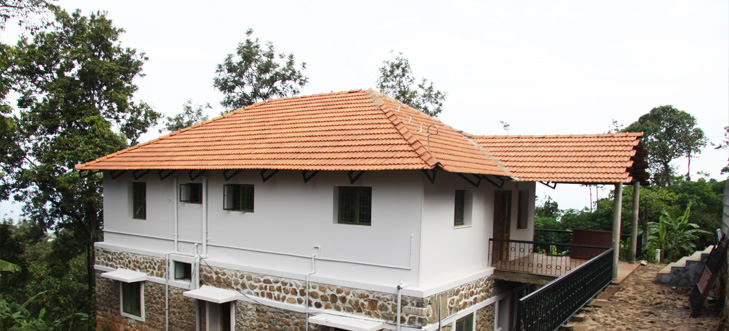
- Making Rural Youth Employable - Download
- National Environmental Awareness Campaign
- NEAC 2025 - 2026 Formats
- Annual Report
- Peace Institute of Social Work

-
Ongoing Projects

a. Integrated Watershed Management Programme (IWMP), Vedasandur
The Programme was designed to improve the livelihood of the rural poor by converting low grade, semi arid, unproductive land to productive land, enabling optimum utilisation of available natural resources and promoting soil and water conservation in the drought prone villages of Vedasandur block of Dindigul district of Tamil Nadu state. Capacity building programmes, soil and water conservation measures and sustainable agricultural measures were implemented with community participation at all levels. The results are encouraging.
b. Watershed Management Programme, Periyakottai
The Programme covers 10 hamlets in Periyakottai Panchayat of Dindigul district. It is a rain dependent area which is low productive due to lack of conservation measures of soil and water. Overexploitation of wells, non-maintenance of tanks and soil erosion had made the land mostly barren. Organising and strengthening the Village Watershed Committee, planning with the participation of farmers and strengthening SHGs prepared the ground for full implementation of the watershed programme with the assistance of NABARD.
c. Action Programmes for Sustainable Development in Coimbatore District
The Kongu region of Coimbatore district of Tamil Nadu is highly polluted through industrial effluents. The factories located along Noyyal River contaminate the waters of the river and the nearby subterranean water sources. Industrialists, employees, popular leaders, elected representatives, administrators, self help groups, youth associations and other sections of the society were given training and education on environment equilibrium, cleaner production technologies, ethical trade practices, eco-friendly and sustainable development, etc. A monthly electronic news bulletin is published for coordination of the programmes.
d. Anti-Child-Labour Action Programme in Karur District
Karur district of Tamil Nadu is one of the most backward areas and the incidence of child labour is very high. To prepare for the successful implementation of eradication of child labour, target villages were surveyed for gathering information and suspected houses were visited for collection of specific data. Motivation programmes were conducted for volunteers and non formal education centres, tuition centres and balwadies were setup. To back up the work, Child Rights Groups were organised and motivation camps were established for child labourers. The Programme has begun to bear fruit with liberation of child labourers and their reenrolment in formal education institutions.
e. Peace Industrial School, Dindigul District
Peace Industrial School of Dindigul district of Tamil Nadu is an education and training centre for the disadvantaged and marginalised children, especially ex-child-labourers, equipping them with formal and informal education and training for self employment and sustainable livelihood. Vocational training to youth with government recognised certificates, seminars and symposia on socio cultural issues, motivation programmes for consumer forums, youth welfare organisations and awareness programmes on HIV/AIDS and health and hygiene are conducted in the School premises.
f. Women Development Programmes
The unemployed and underemployed women of the backward districts of Tamil Nadu have been organised into Self Help Groups, given training for self development and skill development and provided necessary initial financial help for self employment projects. The groups are also assisted in the marketing of the finished products and given the necessary counselling for obtaining financial assistance from the government and other financial institutions.
g. Migrant Labour Welfare Programmes
Sivagangai block of Sivagangai district of Tamil Nadu was selected for intervention programmes for migrant labourers as the number of such people was very high in the area. The migrant labourers and their families were given the necessary education on migration-related problems, especially health problems and HIV/AIDS vulnerability. Migrant Tamil workers all over the world were contacted through publications and internet radio and action taken in cases were they had been cheated by agents or persecuted by employers. Pre-departure training programmes, Peer Educator Training Programmes, information booths and networking through media were utilised to help potential migrant labourers.
h. Core Labour Standard Raising Programmes
Intervention programmes for abolition of child labour and awareness programmes on adherence to ILO conventions such as fundamental principles and rights at work place and ratification of convention 182 have been the thrust areas of Peace Trust. Effective coalition has been built up with trade unions, students, women forums, consumer forums, NGOs and other like-minded institutions for concerted action in these areas.
i. Post – Tsunami Intervention Programmes
In the aftermath of the Tsunami catastrophe that divastated the Tamil Nadu coast in December 2004, the volunteers of Peace Trust rushed to the most affected areas and distributed the most emergent necessities to the victims, such as food, medicines, clothes and utensils. After the initial relief work, long term rehabilitation work began in earnest and is still continuing in full swing. Study materials were distributed and tuition centres and Strahlmann – Peace Support Centre for Children were opened with the aid of foreign benefactor agencies, together with 25 houses at Vellapallom.


